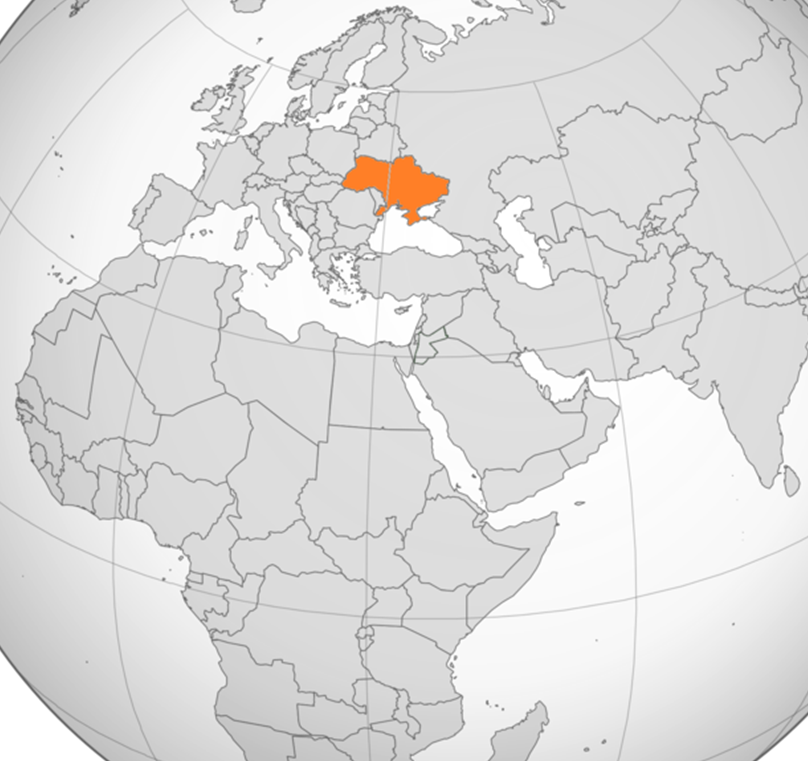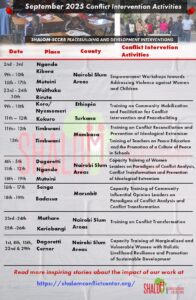
Shalom-SCCRR, through its conflict transformation and peacebuilding strategies, continues to operate in 28 conflict zones in Africa, many of which involve innocent people being persistently killed, maimed and displaced. Drawing on our experience in these situations of manifest and structural violence, here are some critical observations for consideration, concerning our grief, abhorrence and analysis of the wars unfolding in Ukraine and other parts of the world today.
Trigger, proximate and underlying structural causes underpin all these conflicts’ emergence and persistence. The role of power, institutions, and environmental contingencies on human needs (including ontological needs of identity, security, and participation) and development, are dynamically operational in the causes. Each of these causes need careful analytical consideration if a conflict settlement and resolution are to be found. The structural-institutional architecture of international peace and security demonstrating failures that have ultimately contributed to the emergence and escalation of these wars and conflicts should not be ignored or denied.
By no means an issue of less importance is the fickle brittleness of amoral, unethical, and idiosyncratic parasitical political-deviant governance operating in many contexts around the world right now. Neither should issues of the arrogance of ignorance nor the ignorance of arrogance by policymakers and political leaders be left unaddressed by all concerned parties seeking to transform these conflicts. Conflict has a memory that is transgenerational, resilient, robust and anchored in culture, but frequently contaminated and distorted with erroneous historical narratives and media reporting. Mendacious propaganda, demonization and hypocrisy, never benefit the ‘road maps of peace’ that lead to mediation/negotiations processes essential for the emergence of conflict settlement (negative peace) and resolution (positive peace/reconciliation)”.
From a global perspective, ever aware of annihilation threatening nuclear dangers, there is a plethora of population and environmental degradation factors creating major natural resource demand/supply difficulties, generating unsustainable social pressures on the planet. These demand/supply dynamics and related political-economic policy frameworks are frequently, and often surreptitiously, underpinning wars’ origin and escalation. This scenario is compounded perilously by the structural violence of inequity, disparity, and discrepancy in access to livelihood services needed for people to meet basic human/ontological needs, and actualize their potential.
All of these variables, while not exhaustive, lead to a volatile social pressure cooker boiling over cataclysmically into the emergence of manifest violent conflict and its escalation internationally. This is evidenced today in numerous parts of Africa, the Middle East, Asia, South and Latin America and now again tragically unfolding in eastern Europe with its epicenter in Ukraine. The conflict in Ukraine involving the appalling disaster of innocent people being killed maimed and displaced is justifiably receiving high profile global attention, as indeed all wars and conflicts should.
Presently in Africa there are approximately 20 ongoing State based civil wars, hundreds of persistent non-state conflicts (inter-ethnic, natural resource, xenophobia etc) between organized groups and civilian attacks perpetrated by organized religious violent extremist groups (UCDP/PRIO, 2019). These wars/conflicts have resulted in tens of thousands of people being killed and maimed; according to UNHCR there are 30 million internally displaced persons, refugees and asylum-seekers living in Africa, representing almost one-third of the world’s refugee population (https://www.unhcr.org/africa.html#:~:text=Around%2030%20million%20internally%20displaced,of%20the%20world’s%20refugee%20population).
Our solidarity and prayers are with all people affected by these wars and conflicts, and the urgent interventions needed to transform them at this moment in time around the world. Shalom-SCCRR is committed to help in every way possible.
By: Rev. Dr. Patrick Devine, Shalom-SCCRR International Chairman.

